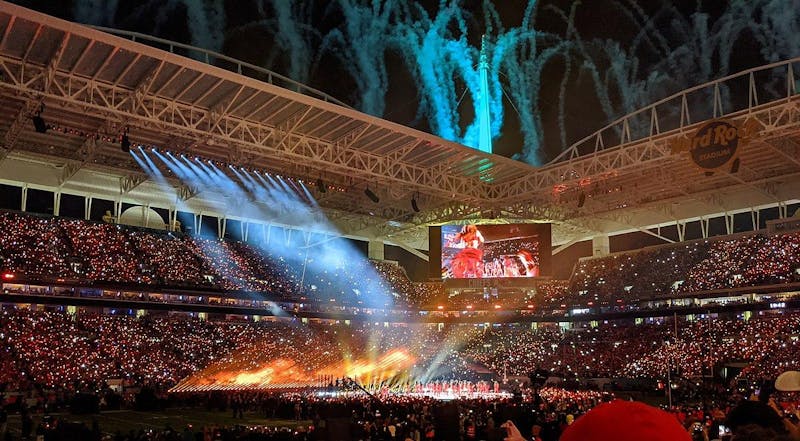
The Super Bowl halftime show is pictured in 2020.
Football is rooted in America. Our culture has been built around it — from scholarships and name, image and likeness deals to the American dream, reaching its pinnacle on the second Sunday of February. This ritual makes football the most popular and profitable sport in America. As it does every year, the NFL reminds the world that at will it can summon the soul of the nation: luxury boxes and Gatorade ambushes, Andy Reid unmuzzled, Tom Brady smiling creepily on television.
Spectacle. The lights were certainly bright enough for Kendrick Lamar.
Nomatter how bad the Kansas City Chiefs lost, there is no defeat comparable to that suffered by Aubrey ‘Drake’ Graham. Kendrick made sure of that. Magic did happen after all, culminating with Kendrick’s “tv off,” and the stadium going black. The TV provided space for Kendrick’s victory lap, which felt akin to pouring a ton of dirt on top of an already-filled grave before telling the viewers to turn it all off. If we obey Kendrick, we must, for one brief second, view our own reflections through darkened televisions — the effects of strobe lights and commercial static imprinted in our vision for a moment until they fade into total darkness.
Once the TV was off and the game was over, who were you as a viewer? Were you paying attention? How many surgeries did Tom Brady have to look like that? I know you wondered. Do you really care about hip-hop beef? Will you play tackle football? Why do you pay your natural cable monopoly to watch advertisements? I don’t remember any ads. Pete Davidson was in one, I think.
The spectacle is great, yes, but exhausting. Only the NFL can justify their dependence on commercials by making them a part of the product. Why are we accepting the overreach of advertising into places that should resist it, like sports? The Olympics understands this better — its lack of any advertisements deeply changes the way we engage with sports for two brief weeks every two years.
As Kendrick alluded to, the practice of watching television is a good way to engage with culture, but once it transcends its own subject, it becomes deeply destructive. All of the American professional sports leagues are financially intertwined with gambling and television contracts — sports are being twisted and minimized at all levels to suit these interests. These boomer television executives in the NCAA are ‘superleagueifiyng’ the FBS conferences to compete with the NFL. College football does not need more popularity, it does not need to expand. The business forces that dominate its broadcast rights say otherwise. In the grand scheme of things, these sports television contracts are an imposition on the sport itself, and their influence can slowly suffocate the deep-seated cultural love that was the original catalyst for its popularity. Go talk to the schools and fans left behind in the Pac-12. Why are sports leagues and television companies incentivized to destroy our sports’ histories in exchange for short-term viewership and profit?
The Super Bowl is the crowning achievement of the golden age of cable television, yet it only maintains its position by desperate spectacle — often the night is remembered for reasons unrelated to the sport itself. Every year we still watch, even though many of the viewers are indifferent to actual playing of football. Why must the cultural pastime be a means to an end, rather than its own end? Are sports and music not enough? I am not wired for the onslaught of commercials and I think my brain is going to break. I am merely a feeble consumer. Is it too much to beg for them to sell us a good product without trying to break us? Why can’t they understand that the commercials are a form of physical punishment? Maybe they understand and are apathetic to our exhaustion. Our bodies are not equipped for the physical experience that is the Super Bowl — consumption of food, content, commercials and catharsis. We take a whole year to recover for the next one.
The NBA must view the Super Bowl’s continued success as a figment of 20th-century monolithic culture, best represented by the fact that Kendrick and commercials overshadowed the game itself. I want to see the NBA compete with the NFL and Super Bowl not by trying to beat them at their own ratings game, but by not playing the same game entirely. Basketball is a 21st-century sport, capable of global expansion by virtue of the game itself. Television must not be its primary source of revenue. Look globally: hundreds of millions play and follow — revealing the sport to be fundamentally similar to soccer in terms of popularity and rivaling it in terms of stardom. I was in Perú over the summer and found basketball courts perched high in the mountains. Many people knew about basketball, and I played in a few games. I saw images of Lionel Messi and Cristiano Ronaldo in many shops, and consistently displayed alongside them were LeBron James and Kobe Bryant. This was a vision of what is possible for a sport that knows its value — one not defined by the bounds of a television broadcast.
This Super Bowl reaffirmed that sports leagues must enter the 21st-centuryand break the status quo of television as the central profit-generator. If you make a television product more accessible, ratings are no longer a question — rather you can put more resources into growing the sport itself. The commercials can come after.
It’s time to turn the TV off.
